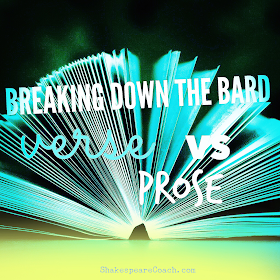One
of the very first things you need to learn as a classical or
Shakespearean actor is how to identify when you are speaking in Verse or
Prose. Knowledge of this super simple thing can be the difference between
looking like you know your stuff or looking like a total noob.
WHAT IS VERSE?
Simply
put, verse is poetry. If a character is speaking in poetry, there is
very often a reason behind it; whether it is because they are addressing
the King, are royalty themselves, or they are in love. It doesn't have
to rhyme, and it isn't necessarily "iambic pentameter" (though it often
is, and we can get into that later).
WHAT IS PROSE?
Prose
is everyday, non-poetic speech. This paragraph, for example, is
entirely in prose. Prose is often used for plain-speaking characters,
and usually - but not always - used to denote characters of lower
social classes. Kings may speak in prose, but when they do, it is generally in
informal situations (like confiding in a close friend).
HOW TO TELL THE DIFFERENCE:
Most
editors make telling the difference between verse and prose as easy as
possible when they are printing a new edition of the play. Here's an
example of what the current industry standard for verse looks like:
Why should you think that I should woo in scorn?
Scorn and derision never come in tears.
Look when I vow, I weep; and vows so born,
In their nativity all truth appears.
How can these things in me seem scorn to you,
Bearing the badge of faith to prove them true?
While prose looks more like this:
I
have of late - but wherefore I know not - lost all my mirth, forgone
all custom of exercises; and indeed it goes so heavily with my
disposition, that this goodly frame, the earth, seems to me a sterile
promontory; this most excellent canopy, the air, look you, this brave
o'erhanging firmament; this majestical roof fretted with golden fire,
why, it appeareth nothing to me but a foul and pestilent congregation of
vapors. What a piece of work is a man, how noble in reason, how
infinite in faculties, in form and moving, how express and admirable in
action, how like an angel in apprehension, how like a god! The beauty of
the world, the paragon of animals, and yet to me what is this
quintessence of dust? Man delights not me - nor woman neither, though by
your smiling, you seem to say so.
One of the
easiest ways to tell if you are working with verse or prose is to see if
the first letter of each line is capitalized. If so, it's probably
verse! If not, and the lines of text fill the entire column in a block
instead of being left justified, then it is probably prose!
There you have it; the first steps to identifying whether you are speaking in verse or prose!
Wanna step up your Shakespeare game?
Email shakespearecoach@gmail.com to book your session and get madskills!
Click here to get my FREE cheat sheet on the Top 5 Mistakes Actors Make in Shakespeare Auditions!
Click here to get my FREE cheat sheet on the Top 5 Mistakes Actors Make in Shakespeare Auditions!


No comments:
Post a Comment